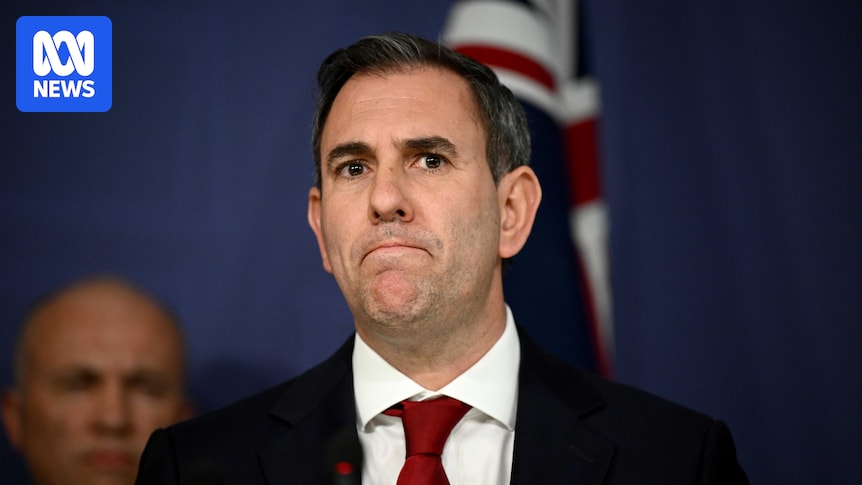Western Australia’s GST deal, expected to cost the Commonwealth $60 billion by 2029, will be reviewed by the Australian Productivity Commission.
Reforms to the GST distribution by the Morrison Government in 2018 mean WA keeps at least 75 cents for every dollar of GST revenue.
Treasurer Jim Chalmers said the review, mandated by law, would examine whether the arrangement is fair and financially sustainable.
“The Productivity Commission Inquiry will look at ways in which the federal financial relations system can best promote fiscal sustainability across the states and territories and the Commonwealth,” he said.
The scope of the inquiry is covered in the Commission’s terms of reference, released today, which include examining whether the GST distribution is fairly allowing state and territories to deliver services.
Jim Chalmers says the review will assess whether the current GST distribution arrangement is fair and sustainable. (ABC News: Ian Cutmore)
The Chamber of Commerce and Industry WA (CCIWA) said the terms were a “starting gun” on Western Australia’s fight to keep the arrangement in place.
“The Prime Minister promised during the election campaign that WA’s current GST deal would stay in place, but we know he’s under significant pressure from east coast governments and commentators to break that promise,” CCIWA chief economist Aaron Morey said.
“Without that deal in 2018, WA would be getting back just 18 cents for every dollar we pay in GST, which adds up to around $6 billion less in this financial year alone.”
Prime Minister Anthony Albanese wrote and signed No Change To WA GST on a reporters arm during a press conference in February 2024. (AAP: Richard Wainwright)
The GST deal has been a point of contention between states and territories since they were last changed in 2018.
Long fought battle
The distribution is supposed to ensure each state and territory is able to provide a comparable level of services to Australians, and prioritise higher needs jurisdictions.
However, Western Australian leaders have long fought to keep a larger share of the GST the state generates.
The changes made in 2018 put in place a “floor” which prevents any jurisdiction from receiving a lesser share than Victoria and New South Wales, which primarily benefited Western Australia.
Aaron Morey said WA received less revenue than any other jurisdiction, compared to how much it brought in. (ABC News: Cason Ho)
Mr Morey said, even with the current floor of 75 cents per dollar of GST revenue earned in WA, the state was still receiving less revenue than any other jurisdiction compared to how much it brought in.
“Other states should be focusing more on developing their own economies like WA has done, rather than throwing stones over a common-sense reform that is clearly in the national interest,” he said.
WA Treasurer and acting Premier Rita Saffioti said WA was already being unfairly taxed through the GST distribution.
“Currently we are penalised. If we get more projects that support more iron ore royalties then we get a significant amount of that redistributed,” she said.
‘Not a new thing’
Ms Saffioti said discussions about whether WA’s share of the GST was fair often lacked the full context.
“We really have to look at the entire context of this discussion … the company tax that these big projects pay doesn’t come to WA, it comes to the nation,” she said.
“The money that WA sends over, in particular company tax, outweighs any of those costs.”
Mr Chalmers rebuked comments reportedly made by Queensland Treasurer David Janetzki that the treasurer was planning a “water-down review” of the GST funding deal.
Rita Saffioti says WA was being unfairly taxed through the GST distribution. (ABC News: Keane Bourke)
“David has made a habit of trying to blame the Commonwealth for his own problems in his own budget,” Mr Chalmers said.
“It’s not a new thing that treasurers would like more money from the Commonwealth.”
The WA government has made no qualms with turning the issue into a fight, saying it has established a GST “fairness fighter” team within its Department of Treasury to lead the state’s response to the Productivity Commission’s review.
The WA government said about $2.5 billion of the state’s GST revenue is redistributed each year to other states and territories.
“Without the 2018 reforms, WA would be left with a grossly inadequate and unsustainable share of GST, undermining our ability to invest in the critical economic infrastructure and support services required,” Ms Saffioti said.
Loading

